“I’M waiting for someone to call me a pendatang!” says Datin Mina Cheah-Foong. “I never thought to question my right to be here or my role as a Malaysian in the context of where my family came from.”
Indeed, why would she need to? Nation building runs in the family. Cheah-Foong may not be planting coconuts or building roads or serving in the police force as her father and ancestors did, but she is responsible for The Body Shop in Malaysia, which she has grown into a multi-million-ringgit business.
The franchise’s success aside, The Body Shop Malaysia has been acknowledged for its campaigns to raise awareness on HIV/AIDS, champion women’s and children’s rights, and save the Belum-Temengor forest.
In this 25 Jan 2011 interview in Subang Jaya, Cheah-Foong shares stories from her family and childhood, and surmises that she’s definitely Malaysian, not Chinese.
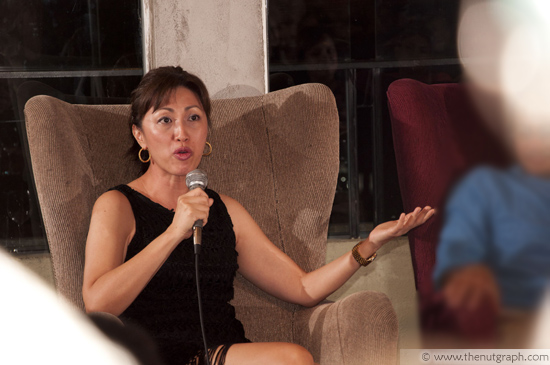
TNG: When and where were you born?
1960 in Sungai Siput, Perak.
And is this where you grew up?
No. I was born there because my father was the officer in charge of the police district in that area. Right after I was born, he was transferred to Kelantan. My mother followed him and I stayed with the babysitter in Ipoh because I was newly born.
Did you eventually move to Kelantan to be with your parents?
No, when my parents came back to Ipoh, I think about a year or so after that, that’s when I went to live with my family. I grew up in Ipoh until I went abroad to study.
How did your parents meet?
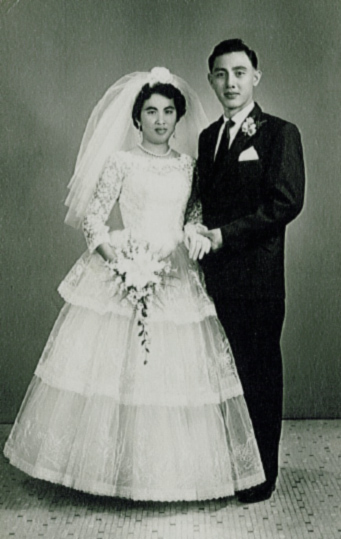
My father met my mother at a dance in [Kuala Lumpur]. My mother had moved to KL from Raub, Pahang, to work as a seamstress with her aunt.
And your dad at that time was already in the police force?
No, my dad at that time was a teacher. My mother always said that if he were a police officer, then they would not have married. Her parents would not have allowed it. Because in those times in the 40s or 50s, among the Chinese they said if you weren’t a bad hat, you wouldn’t join the police.
He joined the police force because it paid more. [The government] had a concerted effort to recruit Chinese police officers for their Special Branch because there was a communist insurgency then. And they needed Chinese-speaking police officers.
Do you remember 1969 and what it was like in Ipoh?
Yes. My mother was very worried about it. We knew early on that there was going to be some trouble obviously because my father was in Special Branch.
For the kids, I guess it wasn’t a big deal because it was just like school holidays. Schools were closed. And it was that keep-very-quiet, stay-in-the-house kind [of experience]. We lived in this housing estate in Ipoh called Canning Garden. Very middle-class.
Everybody knew everybody else. We never saw any violence where we were. And at that time I was nine. So the newspapers wasn’t something I was particularly interested in. I didn’t think very much about it at all. […] Because we were in Ipoh, we were quite far away from the actual violence in KL [and in Penang].
It might just be my recollection, but Ipoh was relatively quiet. At that time when I was growing up, Ipoh was still very much dominated by Chinese tin miners. I don’t even recall discussing it with my Malay friends in school. I think as an adult, if I was older, it may have made more of an impact. To the people who were affected, who had families hurt or killed, or businesses burnt, I’m sure it must be an indelible memory.
Can you trace your ancestry?
Yes. The first ancestor who came from Fukien province to Malaya, that I can trace back, was my grandfather’s grandfather. He was a Tan and he landed in Penang and worked as a labourer. And in his lifetime, apparently, he became very wealthy because at that time, they were trying to open up and develop Penang, and the British colonial government had this law that stated that if you cleared the land and turned it into a plantation, you owned it.
So apparently, this grandfather of my grandfather cleared huge tracts in Air Hitam, and planted them all with coconut trees. He used to own all the land in Jelutong from the mosque up to Air Hitam.
This was my father’s side. Then his daughter was my grandfather’s mother. Her name was Peacock Tan – Tan Khung Cheok.
A powerful name.
Yes, my mother was in awe of her because you had to be very powerful before you can be called Peacock. That time, they used to call all their children Little Dog or Piglet or Sow so that the gods wouldn’t be jealous and [send calamity].
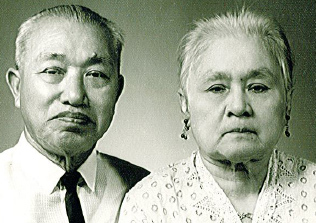
So, anyway, she had three husbands!
(Chuckles) That was how powerful she was!
I knew this as a child because it was family lore. Wah! She had three husbands, and in those times. She came from a Hokkien family [and] Hokkien girls are all very valued. Her father was afraid she would be bullied. You know traditionally in Chinese families, you would become your husband’s property. You had to take his surname and you had to go live in his home and you had to serve the in-laws.
My great-great-grandfather decided that his daughter was not going to have this. So she married the first guy named Cheah [who stayed with her family]. That’s my grandfather’s dad. He died at a very young age, not sure what of.
Then, she married another one called Tan. He turned out to be an opium addict and also died young. And then she married a third fellow. Don’t know what happened to him.
So, your lineage comes from the Cheah line?
Yes, from the first husband. So my grandfather was Cheah Sin Bee. And he studied in school in Penang, and then he was sent to get his degree from Hong Kong University. And on his way back from Hong Kong University, he met my grandmother on the boat coming back. According to my mother, she was from Medan.
And when my grandfather came back to Penang, he was the first Chinese engineer employed by the Penang council to build all these roads in Penang.
And how about your mum’s side?
Her father came from China. So, from my mother’s side, I’m second-generation Malaysian. From my father’s side, I’m fourth-generation. My children are fifth-.
What is your strongest memory of the place where you grew up?
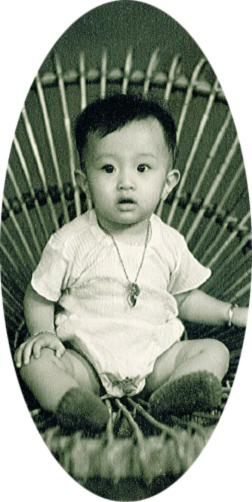
Cycling all over. I used to cycle to the Ipoh Swimming Club. It must have been at least six kilometres. Cycle there, then I’d swim for a couple of hours, then cycle back. Can you imagine!
And I’d cycle from my house all the way to Taman Seenivasagam because they had built the first roller-skating rink. So, I would cycle I think eight kilometres and then roller skate for two hours and then cycle back.
[When I was about five or six, because my parents were travelling around the world], I went back to Sungai Siput to be with my nanny. It was great. It was a real village. There were no roads. Coconut trees growing just next to your house. And then you had the big cinema with rows and rows of rattan chairs. Pay 15 or 20 sen to go in. And I remember the village kids, we used to all go in and have fun playing hide-and-seek in the dark. And no one would yell at us, you know. Can you imagine if someone were to do that now?
What are the stories you hold on to the most from your family?
I guess our holidays to Penang. My grandparents were still there. In fact, my grandfather’s house is still in Penang in Air Hitam.
There was a stream next to it. We used to go fishing. My parents would just drop us in the house and then we made our own fun. My grandfather’s house had all sorts of fruit trees in the garden. We’d just climb the trees, pluck the fruit and eat.
How do you connect these experiences you had to being a Malaysian today?
I never thought to examine it. I never thought to question my right to be here or my role as a Malaysian in the context of where my family came from.
What defined me more was when I first went to visit China with my husband, (Datuk) Simon (Foong). It was in the early 90s. And it shocked me, going to China. I felt very alien. We always say here, “You Chinese, ah?” and I’ll always say, “Ya, I’m Chinese.” I’ll never say, “I’m Malaysian.” Unless I’m abroad.
When I went to China, I was definitely not a Chinese. So, if anything defined me about where I belong, it was my trip to China! That was the moment that I really thought, “I’m not Chinese.” And the Chinese also knew I’m not Chinese. We go there and we speak different. We even look different from the mainland Chinese.
You know, when I’m in the country, I never think about it. And it wasn’t until this interview that I sat down and traced back who [in my family] first came to Malaysia. And then somewhere along the line, there must be some Malay blood in me as well because my father is a full Baba.
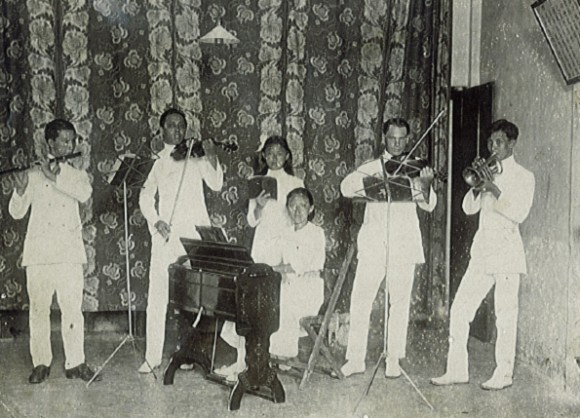
What aspects of your identity do you struggle with the most as a Malaysian, if at all?
(Pauses) I don’t, you know. I’m quite happy and secure that I belong here. That I have a right to be here. I’m waiting for someone to call me a pendatang!
I have no issues about being here. And I also have no issues about people wanting to come and make a life here whether they’re Indonesians, or Burmese or Filipinos. Because the thing is, at one stage or another, most of us migrated from somewhere else.
At some point or other, everybody is a pendatang. So, who are we to point fingers? Who are we to deny someone else the kind of opportunities that we ourselves long for and would have begged to have if we were in their shoes?
Describe the kind of Malaysia you would like for yourself and future generations.
I want a Malaysia where we are allowed to identify ourselves by race but not just be defined by racial stereotypes. I want us to be comfortable saying, “Loshini is Indian. Mina is Chinese. And Jacq is Dan Lain-Lain.” And not be all hung up about it.
I want Malaysia to be a land where people can be free to choose, to enhance or emphasise their Chinese-ness by dressing in a cheongsam every day. And not be defined as, oh, Chinese extremist. And a Hindu girl can be dressed in saree all the time and not be seen as Hindu Sangam or Hindraf. I want us to be able to acknowledge our differences and to accept them. And to respect that other people have differences and to use them to our strength.
When you get down to it, when you’re eating together, when my friend’s son comes over, Adam is Adam. So what if he’s Adam bin Ismail. Why, when we get into the bigger context of things, [does] it become racial and politicised?
I want clever, honest, smart politicians. [I’m] fed up of having no one to vote for.
When do you feel most Malaysian?
I feel most Malaysian when I am at immigration counters. When I’m entering other countries or our country, I feel very Malaysian in terms of belonging to the country.
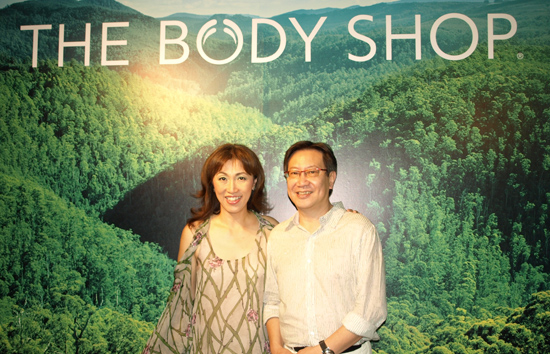
But when I feel most Malaysian is (pauses) … I think it’s probably when I’m at work. Because I’m always thinking about what the Malaysian consumer wants. The staff – we work with a whole bunch of Malaysians and always make sure we’re speaking in a language that everybody understands. And all our campaign materials are always in different languages that customers understand. And we work with local Malaysian NGO partners.
You know, at home, with family, we never think about race. ![]()
The book Found in Malaysia, featuring 50 of our best interviews plus four previously unpublished ones with Datuk Zaid Ibrahim, Tan Sri Rafidah Aziz, Datin Paduka Marina Mahathir and Ramli Ibrahim, is now available at all good bookstores for RM45.


Kong Kek Kuat says
@ Mina Cheah
“And then somewhere along the line, there must be some Malay blood in me as well because my father is a full Baba.”
Oh dear, another one of those living-very-comfortably-in-Malaysia mixing fact and fiction in trying to be that little bit more authentic and multi-cultural than the average Malaysian.
A Baba/Nyonya does not necessarily mean “Malay blood somewhere along the line”; a Baba/Nyonya is not [the counterpart] to a Chitty (where having Malay-blood is an element in the ethnic constitution of being a Chitty).
[…] stop distorting history and turn the Peranakans into genetically Malays or half-Malays. [In general, I would say] we do not want to be genetically Malays or even fractionally Malay. It is suffice to say that we are Malaysians who are open to being culturally a fraction of Malay culture, and we and our ancestors have contributed much to West Malaysia economically, culturally, and patriotically.
jati masian says
So who is the racist here? Three cheers to the Datin.
Idris says
“…we do not want to be genetically Malays or even fractionally Malay.”
Wow. And here I thought it did not matter.
Kong Kek Kuat says
@ Idris
Of course it does not matter… if it was not a distortion of history.
Maybe you would be proud if some Malays come out saying because they are Muslims, then they must have Arab blood somewhere along the line. But I doubt the Arabs would be equally proud.
Merah Silu says
There are many Chinese who called themselves “peranakan” probably either having assimilated with the Malay community in a kampung, or by having married a Malay. Normally when they married to a Malay, somehow, they prefer their children to be associated with Malay (and Muslim), and no longer with Chinese. There are a lot of these people where one of their parents is a Muslim convert.
This second category is okay as they are now preferred to be identified as Malays (meaning the people of this beautiful Malay nusantara) . The first category is also okay, particularly for those who have been staying as part of Malay community, and behave like Malays as well (to practise Malay culture which is the culture of this country).
Other than this, those decendents of Ghee Hin and Hai San who are still practising their Chinese culture and behaviour, and still feel that they are Chinese, are alien to this country, and no different from legal and illegal immigrants from Indonesian, Bangladesh, etc. They could continue with their claim of contributing to the economy of this country. But the Indonesian, Bangladeshis and other illegal immigrants could also make a similar claim.
They are lucky that they can still continue living here comfortably, and are allowed to hold positions in this country. Otherwise many of them will not survive the cultural revolutions and suppression by their own Chinese people.
I think the historical mistake when the Malays took over from British should be corrected. The law should be formulated so that only bumiputera can participate in the election. The rest, i.e. the “Chinese, Indian and others” should enjoy the facilities provided by this country. I think then the country will be far better and the rakyat can live in harmony.
In this case, Pn Mina is a pendatang. But I and my family are the legitimate people of this country.
Kong Kek Kuat says
@ All Peranakans
Besides me, any Peranakan out there who are willing to reply to this colourful Merah Silu?
Does anyone (including the Peranakans) think that we made a historical mistake in sharing much of our culture with the Malays? I mean, most of them are claiming that they are the chosen race of Allah who invented nasi lemak (as it is today).
JW Tan says
Yes, disenfranchise your fellow citizens, why don’t you. I find your post unpleasant and racist.
You should not forget that your fellow citizens of non-bumiputera race helped to provide the facilities they, and you, enjoy. Malaysia’s prosperity did not magic itself out of thin air. It is fantasy to suggest it.
Yee says
Judging from your logic, I could therefore say that our ancestors have indeed committed many “historical mistakes”. Let’s see:
1) Chinese and Indian [Malaysians] shouldn’t have shared their precious culture with Malays. Therefore, there wouldn’t be nasi goreng or teh tarik, which I believe you people have always been enjoying very much; nor would there be certain Silat moves which clearly look like they have been copied from some sort of kung fu or karate.
2) Chinese and Indian [Malaysians] shouldn’t have worked so hard and contributed to the country’s growth (not to mention they’re still the biggest taxpayers in Malaysia). Otherwise you wouldn’t have had the privilege to actually have a computer to type such irresponsible statements.
3) Umno members should have listened to Datuk Onn Jaafar’s suggestion to open up the party’s membership to all races, then there wouldn’t be such tense racial and religious issues as we are facing today.
4) There shouldn’t have been the NEP and Islamisation or even Malaysia in the first place, or else we could’ve become a thriving nation as well as a multicultural hub in the southeast Asian region and not be facing the ridiculous [self-inflicted] issue called “brain drain”.
MOTU says
And the Orang Asli are?
Politicokat says
The Orang Asli are the poor sorry folk who have been robbed blind for centuries. They were even used in the local slave trade until their population crashed.
Tragic story, the Orang Asli. Even the Malays at one time acknowledge they were the real natives.
Politicokat says
The kelong is a piece of Chinese technology. And if you have seen how a keris is made, you would be amazed how similar the setup is to a traditional Chinese worksmith’s. The Indians contributed to the Malay language and art. Wayang kulit anyone? The stories and art form are certainly Indian in origin. Even the white skullcap worn by so many Malays were introduced by Chinese Muslims in the 1800s.
What about duit raya in nice green packets? I remember that piece of Malay culture appearing when I was a kid. Duit raya didn’t always come in the form of green packets and newly minted bills. That bit of tradition was certainly borrowed from the Chinese. Poor Merah has to realise that Malaysia and its lands have always been a crossroads of traditions, cultures and peoples.
Speaking of culture. One thing that concerns me about the Malay culture is the huge push towards Arabization of the Malay community and the banning of various Malay dances and music (which are always claimed to non-Islamic). Is this a danger to the Malay culture? Will Arabic culture be the end of Malay culture? Malay girls in the 1950s certainly did not wear the tudung. And has anybody seen a Malay lady wear a baju kebaya, rather than a baju kurung (which looks rather Arabic), in recent years?
I can play the bonang (an instrument in gamelan) and performed on it during my university years. Can you do the same?
citizen says
Does it matter? You’re looking at the wrong picture, my friend.
A Tan says
Datin is definitely a businesswoman. Kong Kek should let Datin speak her mind freely. […]
sptay says
Before World War I, hardly any Chinese women migrated out of China. Chinese men had been migrating to Southeast Asia for more than a millennium before that. Yes, they ended up marrying locals, and some of their descendants became natives, like many in Thailand, Philippines and even in Malaysia and Indonesia. […]
Cheah Swee Kuan says
I am a Baba, too. In fact, I have some Malay blood as my great-great grandmother is a Malay. My uncles and aunties have names such as Batu and Awang and Manek. In fact we are more bumiputera than Apanama. This guy uses racial politic to suit his needs and tries to change history so that he has justification to call himself a bumi and brand Chinese and other races who were here for generations as pendatang. He needs this racial segregation for him to survive and thrive here.
Politicokat says
My grandmothers on both sides of the family are Nyonyas.
There is a fair bit of Malay/local blood running in my family. My mom was often mistaken as Malay when she was growing up.
The amount of mixing is most apparent when I am abroad. I don’t register as Chinese to the Chinese in [China].
Idris says
If you’re not considered (I use the word ‘considered’ because I believe there is no such thing as ‘pure [insert race here]’) pure chinese, you’re not Chinese not only to the Chinese in China but to those in Malaysia. Utter silliness.
I admit, though, that it beats being called a Malay when you have not even the slightest genetic material that constitutes a ‘Malay’.
Ah well.